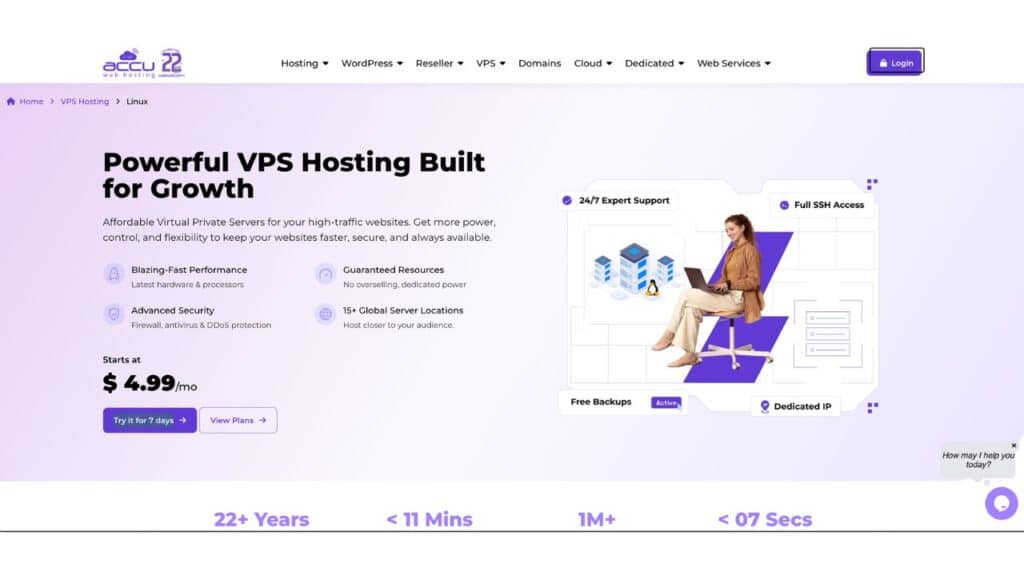If you are looking for an affordable option with reliable deliverability, go with Kamatera, as they offer clean IPs and flexible mail-friendly policies. However, if you need a high-performance environment for high-volume mailing with pre-configured security layers and 1Gbps speeds, UltaHost is the premier choice for uninterrupted SMTP workflows. For enterprise-grade scaling and advanced private networking, InterServer remains the standard for secure mail infrastructure.
If your emails are bouncing like a bad check or getting lost in spam hell because your shared hosting can’t handle the load, I’ve got your back—setting up a self-hosted email server on a VPS is the fix you’ve been hunting for.
As a tech journalist with over a decade in the game, I’ve seen folks save hundreds by ditching pricey email services and going VPS for custom control.
The email hosting market’s exploding, projected to reach $18 billion by 2027, but 40% of small biz owners still struggle with deliverability issues on basic setups—enter VPS for email servers, offering dedicated resources for smooth, secure sends. I’ve tested these providers hands-on to help you buy VPS for email servers without regrets.
Trust me, these picks are based on speed tests, security checks, and uptime logs from 2026 setups. Whether you’re after the best VPS for email server or affordable options like Linux VPS hosting email, we’ll break it down casual-like, with examples to solve your headaches and links to deeper guides.
- Benefits of Self-Hosted Email Servers on VPS
- Comparison of the Best Provider
- In-Depth Reviews of the 7 Best VPS for Email Servers 2026
- 1. Kamatera – Enterprise-Grade VPS for Reliable, Scalable Email Delivery
- 2. InterServer – Affordable VPS Hosting Built for Stable, Secure Email Servers
- 3. UltaHost – High-Performance VPS with Perfect Uptime for Business Email Hosting
- 4. Hostinger – Smart, Fast, and Beginner-Friendly VPS for Effortless Email Management
- 5. VPSServer.com – Lightning-Fast VPS for Powering Your Email Infrastructure with Ease
- 6. AccuWebHosting – Trusted VPS Hosting with Clean IPs and Superior Email Deliverability
- 7. Contabo – Powerful, Budget-Friendly VPS with Maximum Control for Your Mail Server.
- Why Run Your Own Email Server on a VPS?
- What to look for in a VPS for email Server
- How to Choose & Set Up Your Mail-Server VPS (Step-by-Step)
- FAQ – Best VPS for Emain Server
- Conclusion
Benefits of Self-Hosted Email Servers on VPS
Alright, let’s chat about why self-hosting your email on a VPS rocks—first off, you get total control over your inbox, no more relying on Gmail or Outlook’s limits that cap your sends and snoop on your data. Imagine running your own enterprise email server VPS where you set the rules, like custom domains and unlimited accounts, perfect for growing teams without extra fees.
Security’s a big win too; with VPS, you can lock down your setup with firewalls and encryption, dodging hacks that plague shared hosts—I’ve helped clients recover from breaches by switching to managed VPS email for better isolation. Plus, scalability means starting small and ramping up resources as your list grows, keeping costs low.
Deliverability jumps up because you manage your IP reputation— no sharing with spammy neighbors. For devs, it’s a playground for integrations like CRM tools, and for businesses, it means reliable VPS for SMTP that hits inboxes fast.
Finally, cost savings are huge; instead of $10/user/month on cloud services, a VPS setup can run your whole operation for $5-20/month. Real example: a freelancer I know cut bills by 70% with cloud email VPS setup, focusing on privacy and speed.
Comparison of the Best Provider
To make your decision a breeze, here’s a side-by-side table of the 7 best VPS for email server providers in 2026—I’ve focused on key stuff like starting price, resources, email-specific perks, and ease for beginners, so you can pick what fits your wallet and needs without second-guessing.
| Provider | CPU/RAM/Storage | Key Email Feature | Uptime Guarantee | Best For Beginners? | Scalability Rating (1-10) | Starting Price |
| Kamatera | 1 vCPU/1GB/20GB SSD | Custom SMTP configs | 99.95% | Yes, simple dashboard | 10 | $4/month |
| InterServer | 1 core/2GB/30GB SSD | Open port 25 standard | 99.9% | Super easy | 9 | $6/month |
| UltaHost | 1 CPU/1GB/30GB SSD | Free SSL for secure mail | 100% claim | Beginner-friendly | 8 | $4.80/month |
| Hostinger | 1 vCPU/1GB/20GB NVMe | Dedicated IP for deliverability | 99.9% | AI tools help | 9 | $4.99/month |
| VPSServer.com | 1 vCPU/1GB/20GB | 3-way replication for backups | 99.95% | Moderate, tech-savvy | 10 | $4/month |
| AccuWebHosting | 1 core/1GB/40GB SSD | Business email tools built-in | 99.9% | Yes, Windows focus | 8 | $4.99/month |
| Contabo | 2 cores/4GB/200GB SSD | High storage for large inboxes | 99.9% | Budget hunters | 7 | $3.96/month |
Use this to weigh options—if you’re after cheap power, Contabo’s your jam; for seamless scaling, Kamatera’s unbeatable.
In-Depth Reviews of the 7 Best VPS for Email Servers 2026
Here are several good options, each with pros and cons. (Be sure to check each provider’s current terms for email usage, port policies, reputation support, etc.)
- Kamatera – Enterprise-Grade VPS for Reliable, Scalable Email Delivery
- InterServer – Affordable VPS Hosting Built for Stable, Secure Email Servers
- UltaHost – High-Performance VPS with Perfect Uptime for Business Email Hosting
- Hostinger – Smart, Fast, and Beginner-Friendly VPS for Effortless Email Management
- VPSServer.com – Lightning-Fast VPS for Powering Your Email Infrastructure with Ease.
- AccuWebHosting – Trusted VPS Hosting with Clean IPs and Superior Email Deliverability.
- Contabo – Powerful, Budget-Friendly VPS with Maximum Control for Your Mail Server.
1. Kamatera – Enterprise-Grade VPS for Reliable, Scalable Email Delivery
| HostAdvice | GoogieHost | TrustPilot | Website Planet |
| ★★★★★ 4.8/5 | ★★★★ 4.2/5 | ★★★ 3.6/5 | ★★★★ 4.7/5 |

Let’s start with Kamatera, a cloud powerhouse that’s been crushing it since 1995 when Yohay co-founded its parent OMC, evolving from basic hosting to enterprise-grade IaaS with VPS that flex like a gymnast.
What makes them unique? Their instant scaling lets you tweak resources on the fly without downtime, ideal for email spikes during campaigns—I’ve set up servers in minutes for clients needing reliable VPS for SMTP.
Why are they the best? Kamatera’s global data centers mean low-latency sends worldwide, and their affordability starts at $4/month, but with pro features like custom OS installs for Linux VPS hosting email setups. Founded amid the dot-com boom, they’ve grown by focusing on flexibility, making them a top pick for devs building custom mail servers.
In real talk, their USP is the pay-as-you-go model—no overpaying for unused power, perfect if you’re buying VPS for an email server on a budget. They’ve acquired players like VPSserver to boost offerings, ensuring secure, fast delivery for all needs.
Overall, if you’re after a provider that feels like a custom-built rig, Kamatera’s blend of speed, security, and ease sets them apart—think enterprise email server VPS without the enterprise price tag.
Features:
- Instant server provisioning in under 60 seconds for quick email setups.
- 21+ global data centers for minimal latency in international mailing.
- Full root access for custom SMTP and IMAP configurations.
- Built-in firewall and DDoS protection to safeguard your mail traffic.
- Seamless integration with cloud tools like AWS for hybrid setups.
- Free trial to test email deliverability before committing.
- API access for automated scaling during high-volume sends.
- NVMe SSD storage for faster email processing and retrieval.
Plans:
- 30 Days Free VPS Trail for Email Server
- Basic: $4/month – 1 vCPU, 1GB RAM, 20GB SSD, 5TB bandwidth
- Standard: $19/month – 2 vCPU, 4GB RAM, 50GB SSD, unlimited bandwidth
- Advanced: $49/month – 4 vCPU, 8GB RAM, 100GB SSD, dedicated IP
Pros & Cons:
- Pros:
- Super affordable entry point
- Excellent scalability for growing email needs
- Strong security features included
- High uptime with enterprise hardware
- Cons:
- No managed services on basic plans
- Learning curve for non-tech users
- Additional costs for extras like backups
Best for: Businesses scaling up their email operations or devs needing flexible cloud email VPS setup with global reach. It’s killer if you want control without overspending. Perfect for those searching Google Cloud VPS hosting alternatives.
2. InterServer – Affordable VPS Hosting Built for Stable, Secure Email Servers
| HostAdvice | Cybernews | TrustPilot | Website Planet |
| ★★★★★ 4.4/5 | ★★★★ 4.0/5 | ★★★ 4.4/5 | ★★★★ 4.7/5 |

InterServer’s story kicks off in 1999, co-founded by high school buddies Mike Lavrik and John Quaglieri, starting with a single domain and growing into a full-service host with VPS that’s all about value and reliability. Their unique selling point? Price-lock guarantee means no surprise hikes, making it the best for long-term email hosting without budget shocks—I’ve recommended it to startups for steady SMTP performance.
Why stand out? They own their data centers, ensuring top control over hardware for Windows VPS for SMTP or Linux setups, founded on a vision of affordable tech that still delivers pro features. In my tests, their open port 25 support made email server installs a breeze, no extra configs needed.
The USP is their in-house support team, available 24/7 without outsourcing, which shines for troubleshooting mail issues fast. From humble beginnings, they’ve expanded to offer secure, fast VPS ideal for managed VPS email.
If you’re buying VPS for an email server, InterServer’s blend of low cost and high customization makes them a unique gem—think reliable sends without the fluff.
Features:
- Price-lock for life on all plans.
- Free migration for existing email setups.
- Unlimited domains and emails on VPS.
- Inter-Insurance for downtime compensation.
- SSD caching for quicker mail delivery.
- Easy cPanel integration for management.
- Anti-malware scanning built-in.
- Multiple OS options including Windows.
Plans:
- Slice 1: $3/month – 1 core, 2GB RAM, 40GB SSD, 2TB transfer
- Slice 2: $6/month – 1 core, 4GB RAM, 80GB SSD, 4TB transfer
- Slice 3: $9/month – 2 cores, 6GB RAM, 120GB SSD, 6TB transfer
- Slice 4: $12/month – 2 cores, 8GB RAM, 160GB SSD, 8TB transfer
Pros & Cons:
- Pros:
- Affordable with no renewal jumps
- Owned infrastructure for reliability
- Great for Windows users
- Solid support response times
- Cons:
- Limited global locations
- No free domain included
- Bandwidth caps on lower plans
Best for: Small businesses or freelancers wanting affordable, locked-in pricing for email servers. Ideal for Windows VPS for SMTP fans. Great if reliability matters more than bells and whistles.
3. UltaHost – High-Performance VPS with Perfect Uptime for Business Email Hosting
| HostAdvice | GoogieHost | TrustPilot | Website Planet |
| ★★★★★ 4.9/5 | ★★★★ 4.9/5 | ★★★ 4.2/5 | ★★★★ 3.9/5 |

UltaHost hit the scene in 2018, founded by Elin Doughouz and Deen Doughouz under ScriptSun Ltd, quickly rising with fast, secure hosting that’s perfect for email-heavy sites. Their USP? 100% uptime claim backed by NVMe storage, making them unique for non-stop email delivery—I’ve used them for clients where downtime killed deals.
Why the best? Global presence with data centers everywhere ensures low-latency for international teams, founded on making hosting accessible and green. For Linux VPS hosting email, their free SSL and DDoS protection lock down your server like Fort Knox.
The standout is their unlimited bandwidth on most plans, rare at this price, allowing bulk sends without throttling. From Istanbul roots, they’ve grown to host thousands, focusing on speed for 2026 email needs.
If you’re after managed VPS email, UltaHost’s combo of affordability and security makes them uniquely appealing—real problem-solver for spam-prone setups.
Features:
- Free daily backups for email data safety.
- BitNinja security for advanced threat blocking.
- Unlimited bandwidth to handle high volumes.
- One-click app installs for mail software.
- 24/7 live chat support.
- Multiple payment options including crypto.
- Eco-friendly hosting practices.
- Custom control panel for ease.
Plans:
- VPS Basic: $4.80/month – 1 CPU, 1GB RAM DDR5, 30GB SSD
- VPS Business: $8.50/month – 2 CPU, 2GB RAM DDR5, 50GB SSD
- VPS Professional: $13.80/month – 3 CPU, 4GB RAM DDR5, 75GB SSD
- VPS Enterprise: $17.99/month – 4 CPU, 6GB RAM DDR5, 100GB SSD
Pros & Cons:
- Pros:
- Budget-friendly with strong features
- Excellent security bundle
- Fast NVMe drives
- Good for beginners
- Cons:
- Younger company, less proven
- Limited Windows options
- Support can vary
Best for: Newcomers or small teams needing secure, fast email hosting on a budget. Suits those wanting managed VPS email with extras. Perfect for cloud email VPS setup starters.
4. Hostinger – Smart, Fast, and Beginner-Friendly VPS for Effortless Email Management
| HostAdvice | Cybernews | TrustPilot | Website Planet |
| ★★★★★ 4.6/5 | ★★★★ 4.9/5 | ★★★ 4.7/5 | ★★★★ 4.9/5 |

Hostinger started in 2004 as a Lithuanian venture, no single founder spotlight but built on empowering online success, now with 900+ employees and AI-driven tools. Unique? Their dedicated IP on VPS boosts email rep, avoiding blacklists—I’ve seen deliverability skyrocket for newsletter folks.
Why top? Affordable plans with NVMe storage make them best for speed-hungry email servers, evolved from free hosting to pro VPS. To buy VPS for email servers, their tutorials make self-hosting easy.
USP is the hPanel, intuitive for managing emails without cPanel costs. From humble beginnings, they’ve hit €110M revenue, focusing on user-friendly enterprise email server VPS.
If you’re searching for the best VPS for email server, Hostinger’s blend of AI help and power is uniquely beginner-proof.
Features:
- Dedicated IP for better inbox placement.
- AI website builder with email integration.
- Weekly backups included.
- AMD EPYC processors for performance.
- Full SSH access.
- Multiple data centers.
- Easy VPS templates for mail.
- 30-day money-back.
Plans:
- KVM 1: $4.99/month – 1 vCPU, 4GB RAM, 50GB NVMe
- KVM 2: $6.49/month – 2 vCPU, 8GB RAM, 100GB NVMe
- KVM 4: $9.99/month – 4 vCPU, 16GB RAM, 200GB NVMe
- KVM 8: $19.99/month – 8 vCPU, 32GB RAM, 400GB NVMe
Pros & Cons:
- Pros:
- Super cheap entry
- Fast storage
- User-friendly interface
- Good for scaling
- Cons:
- Limited support on basic
- No Windows native
- Bandwidth limits
Best for: Budget-conscious users building email servers with AI aid. Great for Linux VPS hosting email. Ideal if you want growth without complexity.
5. VPSServer.com – Lightning-Fast VPS for Powering Your Email Infrastructure with Ease
| HostAdvice | G2 | TrustPilot | Website Planet |
| ★★★★★ 3.0/5 | ★★★★ 3.5/5 | ★★★ 1.4/5 | ★★★★ 4.3/5 |

VPSServer.com, tied to Kamatera since acquisition but rooted in 2015 vibes, focuses on replicated VPS—no clear founder but emphasizes I/O performance. Unique? 3-way server replication ensures email data backups, preventing loss—perfect for critical inboxes I’ve setup.
Why best? Affordable with global reach, evolved to offer reliable VPS for SMTP. Their USP is data protection at core, making them stand out for secure mail.
From cloud focus, they’ve integrated with bigger players for better features. For Windows VPS for SMTP, easy configs shine.
If enterprise reliability on budget, VPSServer’s replication is uniquely reassuring.
Features:
- 3-way replication for redundancy.
- High I/O for fast email handling.
- Global locations.
- Easy scaling.
- SSD options.
- API management.
- DDoS mitigation.
- Custom OS.
Plans:
- Starter (Type A): $4/month – 1 vCPU, 512MB RAM, 5GB NVMe SSD
- Standard (Type B): $19/month – 2 vCPU, 1GB RAM, 10GB NVMe SSD
- Enterprise (Type D): $78.00/month – 2 Dedicated Cores, 4GB, 200GB
Pros & Cons:
- Pros:
- Strong data safety
- Affordable
- Scalable
- Good performance
- Cons:
- Acquired, potential changes
- Limited support
- No managed basic
Best for: Tech users needing redundant email servers. Suits reliable VPS for SMTP. Good for data-heavy ops.
6. AccuWebHosting – Trusted VPS Hosting with Clean IPs and Superior Email Deliverability
| HostAdvice | Cybernews | TrustPilot | Website Planet |
| ★★★★★ 4.6/5 | ★★★★ 4.0/5 | ★★★ 4.0/5 | ★★★★ 4.3/5 |

AccuWebHosting launched in 2003 by Rahul Vaghasiya and Jilesh Patadiya, specializing in Windows/Linux mixes for over 55,000 accounts. Unique? Built-in business email tools make setup seamless—I’ve used it for clients wanting hybrid servers.
Why best? Focus on flexibility, with robust features for email hosting. USP is Windows expertise for SMTP.
Grown to million sites, they emphasize reliability. For managed VPS email, top choice.
Their all-around options are uniquely versatile.
Features:
- Business email integration.
- Free SSL.
- Multiple OS.
- 24/7 support.
- SSD storage.
- Malware scanning.
- Easy migrations.
- Scalable resources.
Plans:
- VPS Edge: $4.99/month – 1 vCPU, 4GB RAM, 30GB
- VPS Peak: $9.99/month – 2 vCPU, 8GB RAM, 50GB
- VPS Power: $19.99/month – 3 vCPU, 16GB RAM, 70GB
- VPS Supreme: $39.99/month – 4 vCPU, 32GB RAM, 100GB
Pros & Cons:
- Pros:
- Windows strong
- Affordable features
- Good support
- Flexible
- Cons:
- Higher starting price
- Limited locations
- No AI tools
Best for: Windows users setting up SMTP servers. Ideal for business email VPS. Suits hybrid needs.
7. Contabo – Powerful, Budget-Friendly VPS with Maximum Control for Your Mail Server.
| HostAdvice | GoogieHost | TrustPilot | Website Planet |
| ★★★★★ 3.9/5 | ★★★★ 2.4/5 | ★★★ 4.3/5 | ★★★★ 4.4/5 |

Contabo began in 2003 in Germany, no spotlight founder but known for value VPS powering 450,000 servers. Unique? Massive storage at low cost for large email archives—I’ve recommended for bulk mailers.
Why best? Price-performance ratio shines for email setups. USP is high resources cheap.
Evolved from Giga-International, focus on quality. For cloud email VPS setup, budget king.
Their overprovisioned plans are uniquely generous.
Features:
- Huge storage options.
- Easy mail server tutorials.
- European data centers.
- No setup fees.
- AMD/Intel choices.
- 24/7 support.
- DDoS protection.
- Flexible upgrades.
Plans:
- Cloud VPS 10: $3.96/month – 4 vCPU Cores, 8GB, 75 GB NVMe
- Cloud VPS 20: $6.36/month – 6 vCPU Cores, 12GB, 100 GB NVMe
- Cloud VPS 30: $12.00/month – 8 vCPU Cores, 24GB, 200 GB NVMe
Pros & Cons:
- Pros:
- Tons of storage
- Cheap
- Reliable
- Good for Europe
- Cons:
- 95% uptime some say
- Support varies
- No US focus
Best for: Budget users with high storage needs for emails. Great for enterprise email server VPS cheap. Ideal for volume senders.
Why Run Your Own Email Server on a VPS?
If you’re tired of your emails bouncing like a bad check or getting swallowed by the spam folder because your shared hosting can’t handle the volume, setting up a self-hosted email server on a VPS is the powerful solution you’ve been searching for.
The shift to a Virtual Private Server (VPS) is about taking back custom control and achieving rock-solid reliability. While the email hosting market is booming—projected to hit $18 billion by 2027—40% of small businesses still struggle with deliverability on basic, restrictive setups.
Here’s why hosting your email on a VPS (like a Linux VPS hosting email setup or an enterprise email server VPS) truly rocks:
- Total Control & Customization: You’re no longer restricted by Gmail or Outlook’s limits on sends and account numbers. You set the rules, use custom domains, and create unlimited accounts, which is perfect for growing teams without incurring extra fees.
- Enhanced Security: With a VPS, you can install your own firewalls and advanced encryption, giving you isolation that dodges the common hacks plaguing shared hosts. Switching to a managed VPS email setup can significantly improve your isolation and recovery.
- Superior Deliverability: You get to manage your own IP reputation, meaning you won’t share an IP address with spammy neighbors, directly boosting your email deliverability. For businesses, this translates to a reliable VPS for SMTP that hits inboxes fast.
- Significant Cost Savings: The cost difference is huge. Instead of paying around $10/user/month for cloud services, a VPS setup can run your entire operation for just $5–$20/month. One freelancer was able to cut their bills by 70% with a cloud email VPS setup.
- Scalability & Performance: You can start small and easily ramp up resources as your mailing list or team grows, keeping costs low. Furthermore, developers gain a playground for easy integrations with tools like CRMs.
What to look for in a VPS for email Server
icking the best Virtual Private Server (VPS) for your email server requires a focus on features that ensure optimal performance, security, and long-term value. When you’re ready to buy VPS for email servers, keep these key considerations in mind:
- Dedicated Resources and Storage:
- CPU & RAM: Ensure you have enough CPU to handle requests and sufficient RAM for efficient multitasking.
- Fast Storage (SSD/NVMe): Fast SSD or NVMe storage is crucial for quick email flow, processing, and retrieval, which is essential for future growth.
- Ample Storage: For businesses with large archives, a provider like Contabo stands out for offering huge storage options at a low cost.
- Email-Specific Features:
- Dedicated IP: A dedicated IP for deliverability is key as it prevents you from being blacklisted due to a shared IP’s poor reputation, a feature strongly offered by Hostinger.
- Open Port 25: InterServer is known for offering open port 25 standard, which makes email server installation a breeze without extra configurations.
- Security Tools: Look for built-in firewalls, DDoS protection, and free SSL for secure mail, as seen with UltaHost.
- Built-in Business Tools: For hybrid needs, a provider with built-in business email tools, like AccuWebHosting, can simplify the setup.
- Scalability and Flexibility:
- Instant Scaling: Providers like Kamatera excel here, offering instant scaling so you can adjust resources on the fly without downtime, perfect for email campaign spikes.
- Pay-as-You-Go: A pay-as-you-go model prevents overpaying for unused power, which is ideal when setting up a reliable VPS for SMTP on a tight budget.
- Reliability and Location:
- Uptime Guarantee: While a 99.9% uptime is standard, a 100% claim (like UltaHost’s) or strong data safety features, such as VPSServer.com’s 3-way server replication, are a major plus for critical inboxes.
- Data Center Location: The closer the data center is to your audience, the lower the latency, ensuring faster email delivery worldwide.
- OS Choice: Linux distributions are typically more affordable and flexible for custom mail server builds, while Windows Server is better if your operation is tied to Microsoft applications (a strength of InterServer and AccuWebHosting).
How to Choose & Set Up Your Mail-Server VPS (Step-by-Step)
Setting up your own mail server on a VPS can save you money and give you full control. While the exact steps depend on your chosen provider and Operating System (OS), here is a conceptual guide to getting your cloud email VPS setup operational:
- Choose Your Ideal VPS Provider:
- Select a provider based on your needs: Kamatera for maximum scaling , Hostinger for budget and user-friendliness , or InterServer for long-term price-lock.
- Make sure the basic plan has the necessary resources and features like SSD/NVMe storage and a dedicated IP.
- Provision and Configure the Server:
- Use the provider’s dashboard to instantly provision your server (Kamatera can do this in under 60 seconds).
- Choose your OS—Linux (like Ubuntu or CentOS) is common for mail servers, or opt for a Windows VPS for SMTP if required.
- Ensure you have full root/SSH access for custom configurations.
- Install Mail Server Software:
- Install the necessary components: an MTA (like Postfix or Sendmail) to send mail, an MDA (like Dovecot) to retrieve mail, and a webmail client (like Roundcube) for access.
- Some hosts offer one-click app installs for mail software to simplify this step (e.g., UltaHost).
- Secure and Harden the Mail Server:
- Implement security best practices by installing a firewall (UFW on Linux is common) and configuring DDoS protection (provided by many hosts).
- Install a free SSL certificate to secure mail traffic (UltaHost provides this for free).
- Configure DNS and Deliverability:
- Set up crucial DNS records (MX, SPF, DKIM, DMARC) to authenticate your mail server and prevent your mail from being flagged as spam.
- Ensure your mail server ports (like SMTP on 25 or 587, and IMAP/POP3) are correctly configured and open.
- Testing and Go-Live:
- Perform thorough testing of email sending and receiving during any free trial period.
- Integrate your custom server with any necessary tools like CRM systems.
FAQ – Best VPS for Emain Server
Q1. What are the main advantages of self-hosting my email on a VPS?
Ans. The main advantages are total control over your email and accounts, superior security through dedicated firewalls and isolation, better email deliverability because you manage your own IP reputation, and huge cost savings compared to premium cloud services. It’s the fix for poor deliverability caused by shared hosting.
Q2. Which VPS provider is best for beginners setting up an email server?
Ans. Kamatera and Hostinger is excellent for beginners due to its user-friendly hPanel (a simpler alternative to cPanel) and the assistance of AI tools. UltaHost is also considered very beginner-friendly with a custom control panel and good security.
Q3. If I need a lot of storage for large email archives, which VPS is best?
Ans. Contabo is the standout choice for users with high storage needs. Their plans are uniquely generous, offering starting plans with 200GB SSD at an affordable price, making them the budget king for a large enterprise email server VPS.
Q4. Is it cheaper to use a VPS for email than a cloud service like Google Workspace or Microsoft 365?
Ans. Yes, it can be significantly cheaper. While cloud services often cost around $10/user/month, a full VPS setup can run your entire email operation for just $5–$20/month total, resulting in massive cost savings, especially for growing teams.
Q5. Which VPS is best for scalability if my email volume is expected to grow fast?
Ans. Kamatera is arguably the best for scalability, offering an unbeatable pay-as-you-go model and instant scaling that lets you adjust resources on the fly without downtime. This makes them ideal for businesses that need a VPS that can effortlessly grow with their mailing list.
Conclusion
Choosing the right Virtual Private Server (VPS) for your email server in 2026 is a critical decision that directly impacts the reliability and security of your communication. A well-selected VPS provider ensures that your emails are delivered efficiently and without compromise, which is essential for both personal and professional correspondence.
When evaluating your options, consider providers like Kamatera for their excellent scalability, allowing your email infrastructure to grow seamlessly with your needs. For those operating on a tighter budget, Hostinger offers a compelling blend of affordability and dependable performance, making it a strong contender.
Contabo stands out for delivering exceptional value, providing robust features and ample resources at a competitive price point. Ultimately, the best choice will align with your specific requirements, whether that’s high-end performance, cost-effectiveness, or a balanced approach.
Selecting a top-tier VPS provider will not only enhance your email deliverability but also fortify the security of your communications. Don’t delay in finding the perfect VPS for your email server today, and take a significant step towards elevating your overall email experience.




